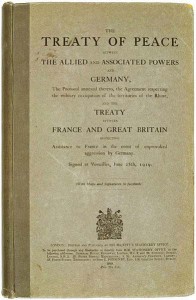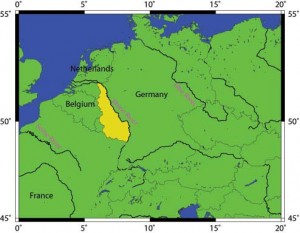 The Rhineland is a region in western Germany that borders Belgium, France, and a section of the Netherlands. The 1919 Treaty of Versailles and the 1925 Locarno Pact clearly stipulated that it was to be made into a demilitarized zone. Although Germany kept political control of the area, the nation was not permitted to have any type of military forces in the Rhineland. Because of this, many Germans believed that they did not really have complete control of the area.
The Rhineland is a region in western Germany that borders Belgium, France, and a section of the Netherlands. The 1919 Treaty of Versailles and the 1925 Locarno Pact clearly stipulated that it was to be made into a demilitarized zone. Although Germany kept political control of the area, the nation was not permitted to have any type of military forces in the Rhineland. Because of this, many Germans believed that they did not really have complete control of the area.
The Treaty of Versailles and The Locarno Pact
The treaties established that only Allied forces could occupy the Rhineland. The Versailles Treaty also established that all Allied armed forces would leave the Rhineland by 1935, though most withdrew by the end of 1930. The Locarno Pact reaffirmed the national boundaries stated in the Treaty of Versailles and also approved German”s admittance into the League of Nations. The “spirit of Locarno” represented hopes for future European goodwill and peace.
This demilitarized Rhineland area was important to France as it acted as a safety barrier between France and Germany. France felt it was necessary to have this in case Germany decided to take military action against them in the future. The British government thought that there a need to rethink the Treaty of Versailles, because many considered some of the stipulations in the treaty to no longer be suitable for the 1930s.
Hitler Plans for the Remilitarization of the Rhineland
In March 1933, Werner von Bloomberg, Germany”s Defense Minister, had plans drafted for the remilitarization of the Rhineland. Many of Germany”s leaders felt that remilitarization should only occur if it was diplomatically acceptable and firmly believed that it would not be possible to reinstate military force before 1937.
In 1935, Germany”s Chancellor Adolf Hitler, canceled the armed forces conditions of the Treaty of Versailles, believing that the western powers would not intercede. Hitler also figured that if he changed his efforts to the eastern areas of Europe, then France might be less willing to get involved militarily. His actions brought immediate condemnation from France and Great Britain, but neither took military action to stop Hitler.
By January 1936, Hitler had made the decision to reoccupy and militarize the Rhineland. He had originally planned to remilitarize this area in 1937, but decided to change his plans to early 1936 because of the ratification of the 1935 Franco-Soviet pact. Germany viewed the 1935 Franco-Soviet Treaty of Mutual Assistance as a violation of the Locarno Pact. Hitler also thought that France would have more military armed forces by 1937.
On February 12, 1936, Hitler told his Marshal Werner von Bloomberg (his Field Marshall), of his intentions. He met with General Werner von Fritsch, to find out how much time would be needed to move several infantry battalions and one artillery battery to the Rhineland area. Fritsch responded that it would most likely take at least three days to organize the plan. He also told Hitler that Germany should negotiate the remilitarization of the Rhineland because he thought that Germany”s military forces were not ready for military action with French armed forces.
General Ludwig Beck (Hitler”s Chief of the General Staff) also cautioned Hitler that their military forces would not be able to successfully defend the country if France attacked them in the Rhineland. Hitler told Fritsch that he would order all German armed forces out of the area if France intervened militarily. The Rhineland remilitarization operation was given the code name Operation Winter Exercise.
German Troops Enter the Rhineland
On March 7, 1936, Hitler denounced the Locarno Pact and ordered his German troops to reoccupy the demilitarized zone which included Saarbrucken, Aachen, and Trier. Shortly after daybreak on March 7, 1936, nearly twenty German infantry battalions, along with a small number of planes moved into the Rhineland. In total, there was about 32,000 armed policemen and soldiers who occupied the Rhineland. This was the first time that German armed forces had been in this area since the last part of World War I.
By 11:00 a.m., they had reached the Rhine River, after which three battalions crossed over to the Rhine”s west bank area. Soon after, German reconnaissance forces discovered that several thousand French troops had congregated very close to the Franco-German border. At this point, General Bloomberg pleaded with Hitler to evacuate all of their armed German forces from the Rhineland territory.
Hitler then asked if the French military forces had in fact crossed the border area, and when he was told they had not, he informed Bloomberg that they should stay the course unless the French Army crossed the border. It has been reported that even though Bloomberg was extremely nervous during the course of Operation Winter Exercise, Baron Konstantin von Neurath (Hitler”s foreign minister) remained calm and told Hitler not to withdraw the Germany Army.
After the Remilitarization of the Rhineland
The German military force that was used for this military action was rather small as they were significantly outnumbered by the French military force that was very close to the border. Later, Hitler commented that the Rhineland military operation was an extremely nerve-racking time for him. The success of Operation Winter Exercise secured Hitler”s popularity with not only his army generals, but also with the German people.
Because France had been experiencing a political crisis during this time, there was not any political leadership to focus on the remilitarization of the Rhineland. British leadership thought Nazi Germany was just entering their own backyard and that there was no need to enforce this part of the Treaty of Versailles.
Great Britain”s Foreign Office expressed frustration over Hitler”s unilateral move because they had been proposing a negotiation for Germany to remilitarize the Rhineland territory. The Foreign Office stated that Hitler had deprived them of the possibility of a concession which could have been very useful to Great Britain. Many of Great Britain”s leaders had consented to talks with France about remilitarization negotiations, but several British ministers were unsatisfied with the direction of the negotiation talks.
Following the remilitarization of the Rhineland, Hitler spoke in public about his wish to have peace throughout all of Europe. He even wanted to engage in talks with France and Belgium about agreeing to new non-aggression pacts. While doing so, Germany was very rapidly constructing their defensive fortifications along the Belgium and French borders.
